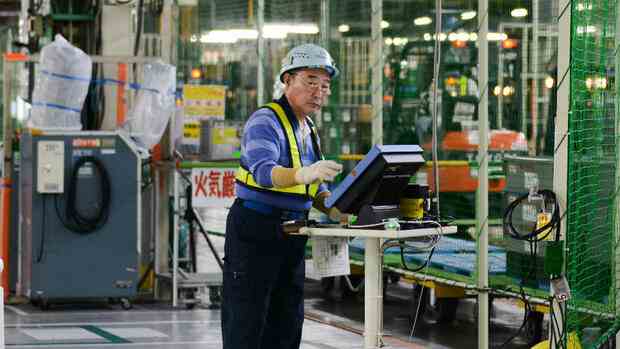According to the union, Toyota workers are getting the biggest wage increase in 20 years.
(Photo: Bloomberg/Getty Images)
Tokyo The new Toyota boss Koji Sato made his employees happy even before he officially took office. Unusually early this week, the world’s largest automaker ended collective bargaining and accepted the wage demands of the company union in full.
The group did not reveal exactly how much the salaries would increase. But the Toyota union celebrated the success as the biggest wage increase in 20 years.
Sato, who officially became Toyota CEO on April 1, sees himself as a trendsetter for this year’s pay round at Japanese companies. “We have decided to react now and hope that negotiations will move forward across the industry,” he said on Wednesday. In fact, Toyota is not alone with the apparently hefty salary increase.
In Japan, real wages have remained almost flat since the mid-1990s. But under the pressure of inflation, which has also traditionally been low in Japan and recently rose to four percent, more and more companies are abandoning their cautious wage policies.
Toyota’s local rival Honda wants to increase salaries by five percent, and even by ten percent for newly hired employees. The video game giant Nintendo promises a ten percent increase in base salary. And the world’s largest electric motor manufacturer, Nidec, is considering raising salaries by 30 percent by 2025.
Designated central bank chief Ueda must face parliament
This means that real wages for many employees in large corporations are growing noticeably again for the first time. That alone would make headlines in Japan. The result of the wage round is also awaited with particular suspense because it will have an impact on the monetary policy of the designated head of the central bank, Kazuo Ueda.
>> Read also: Japan’s economy is growing slowly
On Friday, the economics professor will answer questions from MPs in Parliament. The big question is whether he will end Japan’s negative interest rate policy once he takes office in April. Stefan Angrick, an economist at Moody’s Analytics in Tokyo, expects “that the bank’s new leadership will emphasize that a real rate hike – including in the short-term policy rate – remains dependent on stronger wage growth and higher demand”.
The incumbent head of the central bank, Haruhiko Kuroda, had previously stated that wage growth of three percent was necessary in order to achieve the inflation target of two percent in the long term. The Bank of Japan has therefore been encouraging even the unions for years to finally make higher demands.
Even conservative leaders have urged managers of profitable companies to raise wages more to boost domestic demand. Prime Minister Fumio Kishida is no exception. In January he promised labor market reforms to build the basis for sustainable wage increases and more economic growth. “First and foremost, wage increases that exceed price increases must be achieved,” Kishida said.
The future head of the Japanese central bank will have to decide when and if interest rates in Japan should rise.
(Photo: Bloomberg)
But even though the population is shrinking faster and the labor shortage is growing, companies have done less than politically desired. That is now changing. This year, wage increases could even exceed the official target, predicts Kentaro Koyama, an economist at Deutsche Bank in Japan. “We stand by our forecast that they will come in at 3.5 percent, well above the market consensus of under 3 percent,” he wrote in a report this week.
He is raising his inflation forecast because of rising food prices and “accelerating wage growth”. Unlike the central bank, Koyama no longer expects the core inflation rate to fall below the inflation target of two percent by the end of the year, excluding volatile energy prices. So far, however, this prospect has been an argument used by the central bank not to raise interest rates, unlike many central banks in industrialized countries.
Small and medium-sized companies, which provide around 70 percent of jobs, remain the major source of uncertainty. Bearing the brunt of inflation and growing labor shortages, they have fewer buffers than the corporations, which have accumulated record reserves after years of strong profits.
Around 60 percent of companies do not pay corporate tax because they officially do not make a profit. No wonder, then, that in a survey by the life insurer Daido Life at the end of 2022, only 34 percent of 9,000 medium-sized companies surveyed said they wanted to increase wages. Only 15 percent were willing to pay more than four percent above the inflation rate.
Toyota’s move might persuade some CEOs to pay more. Because the car manufacturer is generally attributed a great signal effect in Japan.
More: 7000 euros bonus per child – How Japan wants to attract city dwellers to the countryside
